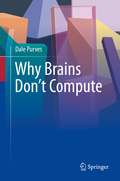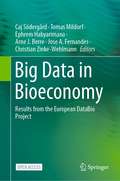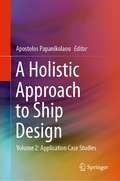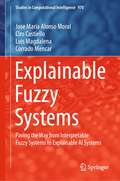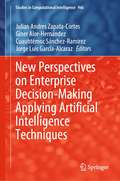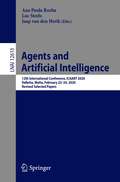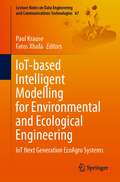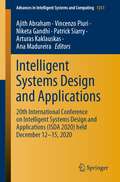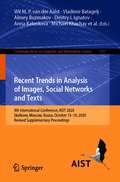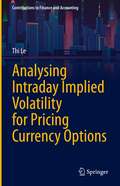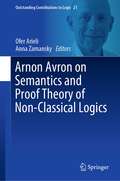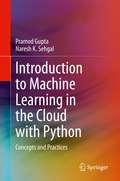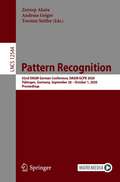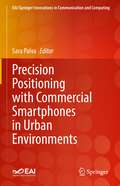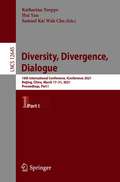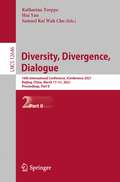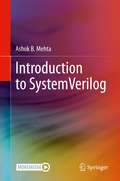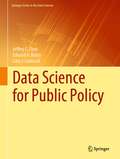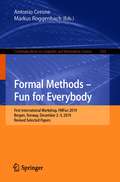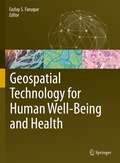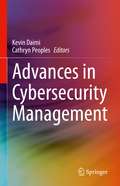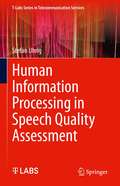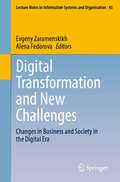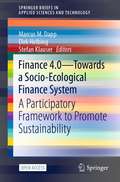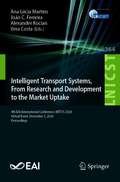- Table View
- List View
Why Brains Don't Compute
by Dale PurvesThis book examines what seems to be the basic challenge in neuroscience today: understanding how experience generated by the human brain is related to the physical world we live in. The 25 short chapters present the argument and evidence that brains address this problem on a wholly trial and error basis. The goal is to encourage neuroscientists, computer scientists, philosophers, and other interested readers to consider this concept of neural function and its implications, not least of which is the conclusion that brains don’t “compute.”
Big Data in Bioeconomy: Results from the European DataBio Project
by Christian Zinke-Wehlmann Caj Södergård Tomas Mildorf Ephrem Habyarimana Arne J. Berre Jose A. FernandesThis edited open access book presents the comprehensive outcome of The European DataBio Project, which examined new data-driven methods to shape a bioeconomy. These methods are used to develop new and sustainable ways to use forest, farm and fishery resources. As a European initiative, the goal is to use these new findings to support decision-makers and producers – meaning farmers, land and forest owners and fishermen.With their 27 pilot projects from 17 countries, the authors examine important sectors and highlight examples where modern data-driven methods were used to increase sustainability. How can farmers, foresters or fishermen use these insights in their daily lives? The authors answer this and other questions for our readers. The first four parts of this book give an overview of the big data technologies relevant for optimal raw material gathering. The next three parts put these technologies into perspective, by showing useable applications from farming, forestry and fishery. The final part of this book gives a summary and a view on the future.With its broad outlook and variety of topics, this book is an enrichment for students and scientists in bioeconomy, biodiversity and renewable resources.
A Holistic Approach to Ship Design: Volume 2: Application Case Studies
by Apostolos PapanikolaouThis book deals with modern Computer-Aided Design (CAD) software tools and platforms implemented in ship design, the integration of techno-economic databases, the use of optimisation and simulation software tools, which are integrated in these platforms, and the virtual modelling of ships and their operation by using a Virtual Vessel Framework (VVF). It contains a series of application case studies related to the developed holistic approach to ship design and operation. Nine case studies are described, referring to the design and operation of various ship types, namely RoPax, cruise ship, double-ended ferry, bulk carrier, containership, offshore support vessel, ocean surveillance ship and research vessel and one offshore structure. All case studies are driven by leading representatives of the European Maritime Industry. This book complements A Holistic Approach to Ship Design, volume 1, which covers methods and tools for the life cycle optimisation and assessment of ship design and operation.
Explainable Fuzzy Systems: Paving the Way from Interpretable Fuzzy Systems to Explainable AI Systems (Studies in Computational Intelligence #970)
by Jose Maria Alonso Moral Ciro Castiello Luis Magdalena Corrado MencarThe importance of Trustworthy and Explainable Artificial Intelligence (XAI) is recognized in academia, industry and society. This book introduces tools for dealing with imprecision and uncertainty in XAI applications where explanations are demanded, mainly in natural language. Design of Explainable Fuzzy Systems (EXFS) is rooted in Interpretable Fuzzy Systems, which are thoroughly covered in the book. The idea of interpretability in fuzzy systems, which is grounded on mathematical constraints and assessment functions, is firstly introduced. Then, design methodologies are described. Finally, the book shows with practical examples how to design EXFS from interpretable fuzzy systems and natural language generation. This approach is supported by open source software. The book is intended for researchers, students and practitioners who wish to explore EXFS from theoretical and practical viewpoints. The breadth of coverage will inspire novel applications and scientific advancements.
New Perspectives on Enterprise Decision-Making Applying Artificial Intelligence Techniques (Studies in Computational Intelligence #966)
by Julian Andres Zapata-Cortes Giner Alor-Hernández Cuauhtémoc Sánchez-Ramírez Jorge Luis García-AlcarazThis book presents different techniques and methodologies that used to help improve the decision-making process and increase the likelihood of success in sector as follows: agriculture, financial services, logistics, energy services, health and others. This book collects and consolidates innovative and high-quality research contributions regarding the implementation techniques and methodologies applied in different industrial sectors. The scope is to disseminate current trends knowledge in the implementation of artificial intelligence techniques and methodologies in different fields as follows: supply chain, business intelligence, e-commerce, social media and others. The book contents are useful for Ph.D., Ph.D. students, master and undergraduate students, and professional and students in industrial engineering, computer science, information systems, data analytics and others.
Agents and Artificial Intelligence: 12th International Conference, ICAART 2020, Valletta, Malta, February 22–24, 2020, Revised Selected Papers (Lecture Notes in Computer Science #12613)
by Ana Paula Rocha Luc Steels Jaap van den HerikThis book contains the revised and extended versions of selected papers from the 12th International Conference on Agents and Artificial Intelligence, ICAART 2020, held in Valletta, Malta, in February 2020. Overall, 45 full papers, 74 short papers, and 56 poster papers were carefully reviewed and selected from 276 initial submissions. 23 of the 45 full papers were selected to be included in this volume. These papers deal with topics such as agents and artificial intelligence.
IoT-based Intelligent Modelling for Environmental and Ecological Engineering: IoT Next Generation EcoAgro Systems (Lecture Notes on Data Engineering and Communications Technologies #67)
by Paul Krause Fatos XhafaThis book brings to readers thirteen chapters with contributions to the benefits of using IoT and Cloud Computing to agro-ecosystems from a multi-disciplinary perspective. IoT and Cloud systems have prompted the development of a Cloud digital ecosystem referred to as Cloud-to-thing continuum computing. The key success of IoT computing and the Cloud digital ecosystem is that IoT can be integrated seamlessly with the physical environment and therefore has the potential to leverage innovative services in agro-ecosystems. Areas such as ecological monitoring, agriculture, and biodiversity constitute a large area of potential application of IoT and Cloud technologies. In contrast to traditional agriculture systems that have employed aggressive policies to increase productivity, new agro-ecosystems aim to increase productivity but also achieve efficiency and competitiveness in modern sustainable agriculture and contribute, more broadly, to the green economy and sustainable food-chain industry. Fundamental research as well as concrete applications from various real-life scenarios, such as smart farming, precision agriculture, green agriculture, sustainable livestock and sow farming, climate threat, and societal and environmental impacts, is presented. Research issues and challenges are also discussed towards envisioning efficient and scalable solutions to agro-ecosystems based on IoT and Cloud technologies. Our fundamental belief is that we can collectively trigger a new revolution that will transition agriculture into an equable system that not only feeds the world, but also contributes to mitigating the climate change and biodiversity crises that our historical actions have triggered.
Intelligent Systems Design and Applications: 20th International Conference on Intelligent Systems Design and Applications (ISDA 2020) held December 12-15, 2020 (Advances in Intelligent Systems and Computing #1351)
by Ajith Abraham Vincenzo Piuri Niketa Gandhi Patrick Siarry Arturas Kaklauskas Ana MadureiraThis book highlights recent research on intelligent systems and nature-inspired computing. It presents 130 selected papers from the 19th International Conference on Intelligent Systems Design and Applications (ISDA 2020), which was held online. The ISDA is a premier conference in the field of computational intelligence, and the latest installment brought together researchers, engineers and practitioners whose work involves intelligent systems and their applications in industry. Including contributions by authors from 40 countries, the book offers a valuable reference guide for all researchers, students and practitioners in the fields of Computer Science and Engineering.
Recent Trends in Analysis of Images, Social Networks and Texts: 9th International Conference, AIST 2020, Skolkovo, Moscow, Russia, October 15–16, 2020 Revised Supplementary Proceedings (Communications in Computer and Information Science #1357)
by Wil M. P. van der Aalst Vladimir Batagelj Alexey Buzmakov Dmitry I. Ignatov Anna Kalenkova Michael Khachay Olessia Koltsova Andrey Kutuzov Sergei O. Kuznetsov Irina A. Lomazova Natalia Loukachevitch Ilya Makarov Amedeo Napoli Alexander Panchenko Panos M. Pardalos Marcello Pelillo Andrey V. Savchenko Elena TutubalinaThis book constitutes revised selected papers of the 9th International Conference on Analysis of Images, Social Networks and Texts, AIST 2020, held in Moscow, Russia, in october 2020. Due to the COVID-19 pandemic the conference was held online. The 14 full papers, 9 short papers and 4 poster papers were carefully reviewed and selected from 108 qualified submissions. The papers are organized in topical sections on natural language processing; computer vision; social network analysis; data analysis and machine learning; theoretical machine learning and optimization; process mining; posters.
Analysing Intraday Implied Volatility for Pricing Currency Options (Contributions to Finance and Accounting)
by Thi LeThis book focuses on the impact of high-frequency data in forecasting market volatility and options price. New technologies have created opportunities to obtain better, faster, and more efficient datasets to explore financial market phenomena at the most acceptable data levels. It provides reliable intraday data supporting financial investment decisions across different assets classes and instruments consisting of commodities, derivatives, equities, fixed income and foreign exchange. This book emphasises four key areas, (1) estimating intraday implied volatility using ultra-high frequency (5-minutes frequency) currency options to capture traders' trading behaviour, (2) computing realised volatility based on 5-minute frequency currency price to obtain speculators' speculation attitude, (3) examining the ability of implied volatility to subsume market information through forecasting realised volatility and (4) evaluating the predictive power of implied volatility for pricing currency options. This is a must-read for academics and professionals who want to improve their skills and outcomes in trading options.
Arnon Avron on Semantics and Proof Theory of Non-Classical Logics (Outstanding Contributions to Logic #21)
by Ofer Arieli Anna ZamanskyThis book is a collection of contributions honouring Arnon Avron’s seminal work on the semantics and proof theory of non-classical logics. It includes presentations of advanced work by some of the most esteemed scholars working on semantic and proof-theoretical aspects of computer science logic. Topics in this book include frameworks for paraconsistent reasoning, foundations of relevance logics, analysis and characterizations of modal logics and fuzzy logics, hypersequent calculi and their properties, non-deterministic semantics, algebraic structures for many-valued logics, and representations of the mechanization of mathematics.Avron’s foundational and pioneering contributions have been widely acknowledged and adopted by the scientific community. His research interests are very broad, spanning over proof theory, automated reasoning, non-classical logics, foundations of mathematics, and applications of logic in computer science and artificial intelligence. This is clearly reflected by the diversity of topics discussed in the chapters included in this book, all of which directly relate to Avron’s past and present works. This book is of interest to computer scientists and scholars of formal logic.
Introduction to Machine Learning in the Cloud with Python: Concepts and Practices
by Pramod Gupta Naresh K. SehgalThis book provides an introduction to machine learning and cloud computing, both from a conceptual level, along with their usage with underlying infrastructure. The authors emphasize fundamentals and best practices for using AI and ML in a dynamic infrastructure with cloud computing and high security, preparing readers to select and make use of appropriate techniques. Important topics are demonstrated using real applications and case studies.
Pattern Recognition: 42nd DAGM German Conference, DAGM GCPR 2020, Tübingen, Germany, September 28 – October 1, 2020, Proceedings (Lecture Notes in Computer Science #12544)
by Zeynep Akata Andreas Geiger Torsten SattlerThis book constitutes the refereed proceedings of the 42nd German Conference on Pattern Recognition, DAGM GCPR 2020, which took place during September 28 until October 1, 2020. The conference was planned to take place in Tübingen, Germany, but had to change to an online format due to the COVID-19 pandemic.The 34 papers presented in this volume were carefully reviewed and selected from a total of 89 submissions. They were organized in topical sections named: Normalizing Flow, Semantics, Physics, Camera Calibration and Computer Vision, Pattern Recognition, Machine Learning.
Precision Positioning with Commercial Smartphones in Urban Environments (EAI/Springer Innovations in Communication and Computing)
by Sara PaivaThis book discusses recent technologies and case studies that aim to enhance positioning obtained with commercial smartphones in urban environments, overcoming difficulties with GPS. The authors provide insight into recent trends and innovation on technologies, solutions and approaches to overcome GPS issues in urban environments, due to the existence of a big number of buildings. Topics include security and legal aspects related to positioning systems, the usage of crowdsourcing approaches to enhance positioning, location-based services, proximity based-social networking, satellite navigation and Bluetooth low-energy based systems. The book provides important information for developers that intend to make use of precise positioning for the purpose of commercial applications as well as for research and innovation.Discusses technologies that enhance positioning obtained with commercial smartphones in urban environments;Presents innovations to overcome GPS issues in urban environments caused by dense cities;Includes applications of precise positioning, including their security issues and challenges.
Diversity, Divergence, Dialogue: 16th International Conference, iConference 2021, Beijing, China, March 17–31, 2021, Proceedings, Part I (Lecture Notes in Computer Science #12645)
by Katharina Toeppe Hui Yan Samuel Kai Wah ChuThis two-volume set LNCS 12645-12646 constitutes the refereed proceedings of the 16th International Conference on Diversity, Divergence, Dialogue, iConference 2021, held in Beijing, China, in March 2021. The 32 full papers and the 59 short papers presented in this volume were carefully reviewed and selected from 225 submissions. They cover topics such as: AI and machine learning; data science; human-computer interaction; social media; digital humanities; education and information literacy; information behavior; information governance and ethics; archives and records; research methods; and institutional management.
Diversity, Divergence, Dialogue: 16th International Conference, iConference 2021, Beijing, China, March 17–31, 2021, Proceedings, Part II (Lecture Notes in Computer Science #12646)
by Katharina Toeppe Hui Yan Samuel Kai Wah ChuThis two-volume set LNCS 12645-12646 constitutes the refereed proceedings of the 16th International Conference on Diversity, Divergence, Dialogue, iConference 2021, held in Beijing, China, in March 2021. The 32 full papers and the 59 short papers presented in this two-volume set were carefully reviewed and selected from 225 submissions. They cover topics such as: AI and machine learning; data science; human-computer interaction; social media; digital humanities; education and information literacy; information behavior; information governance and ethics; archives and records; research methods; and institutional management.
Introduction to SystemVerilog
by Ashok B. MehtaThis book provides a hands-on, application-oriented guide to the entire IEEE standard 1800 SystemVerilog language. Readers will benefit from the step-by-step approach to learning the language and methodology nuances, which will enable them to design and verify complex ASIC/SoC and CPU chips. The author covers the entire spectrum of the language, including random constraints, SystemVerilog Assertions, Functional Coverage, Class, checkers, interfaces, and Data Types, among other features of the language. Written by an experienced, professional end-user of ASIC/SoC/CPU and FPGA designs, this book explains each concept with easy to understand examples, simulation logs and applications derived from real projects. Readers will be empowered to tackle the complex task of multi-million gate ASIC designs.Provides comprehensive coverage of the entire IEEE standard SystemVerilog language;Covers important topics such as constrained random verification, SystemVerilog Class, Assertions, Functional coverage, data types, checkers, interfaces, processes and procedures, among other language features;Uses easy to understand examples and simulation logs; examples are simulatable and will be provided online;Written by an experienced, professional end-user of ASIC/SoC/CPU and FPGA designs.This is quite a comprehensive work. It must have taken a long time to write it. I really like that the author has taken apart each of the SystemVerilog constructs and talks about them in great detail, including example code and simulation logs. For example, there is a chapter dedicated to arrays, and another dedicated to queues - that is great to have! The Language Reference Manual (LRM) is quite dense and difficult to use as a text for learning the language. This book explains semantics at a level of detail that is not possible in an LRM. This is the strength of the book. This will be an excellent book for novice users and as a handy reference for experienced programmers. Mark GlasserCerebras Systems
Data Science for Public Policy (Springer Series in the Data Sciences)
by Jeffrey C. Chen Edward A. Rubin Gary J. CornwallThis textbook presents the essential tools and core concepts of data science to public officials, policy analysts, and economists among others in order to further their application in the public sector. An expansion of the quantitative economics frameworks presented in policy and business schools, this book emphasizes the process of asking relevant questions to inform public policy. Its techniques and approaches emphasize data-driven practices, beginning with the basic programming paradigms that occupy the majority of an analyst’s time and advancing to the practical applications of statistical learning and machine learning. The text considers two divergent, competing perspectives to support its applications, incorporating techniques from both causal inference and prediction. Additionally, the book includes open-sourced data as well as live code, written in R and presented in notebook form, which readers can use and modify to practice working with data.
Formal Methods – Fun for Everybody: First International Workshop, FMFun 2019, Bergen, Norway, December 2–3, 2019, Revised Selected Papers (Communications in Computer and Information Science #1301)
by Antonio Cerone Markus RoggenbachThis volume constitutes the post-workshop proceedings of the First International Workshop on Formal Methods – Fun for Everybody, FMFun 2019, held in Bergen, Norway, in December 2019.The 7 revised full papers and 2 revised short papers presented in this volume were carefully reviewed and selected from 15 submissions. A white paper and two keynote papers are also included. The papers explore ways of utilizing the pathway to transforming and spreading formal methods. The vision of this workshop series is that formal methods ought to be taught in such a way that every student can have fun with it.
Geospatial Technology for Human Well-Being and Health
by Fazlay S. FaruqueOver the last thirty years or so, there have been tremendous advancements in the area of geospatial health; however, somehow, two aspects have not received as much attention as they should have received. These are a) limitations of different spatial analytical tools and b) progress in making geospatial environmental exposure data available for advanced health science research and for medical practice. This edited volume addresses those two less explored areas of geospatial health with augmented discussions on the theories, methodologies and limitations of contemporary geospatial technologies in a wide range of applications related to human well-being and health. In 20 chapters, readers are presented with an up-to-date assessment of geospatial technologies with an emphasis on understanding general geospatial principles and methodologies that are often overlooked in the research literature. As a result, this book will be of interest to both newcomers and experts in geospatial analysis and will appeal to students and researchers engaged in studying human well-being and health. Chapters are presenting new concepts, new analytical methods and contemporary applications within the framework of geospatial applications in human well-being and health. The topics addressed by the various chapter authors include analytical approaches, newer areas of geospatial health application, introduction to unique resources, geospatial modeling, and environmental pollution assessments for air, water and soil.Although geospatial experts are expected to be the primary readers, this book is designed in such a way so that the public health professionals, environmental health scientists and clinicians also find it useful with or without any familiarity with geospatial analysis.
Advances in Cybersecurity Management
by Kevin Daimi Cathryn PeoplesThis book concentrates on a wide range of advances related to IT cybersecurity management. The topics covered in this book include, among others, management techniques in security, IT risk management, the impact of technologies and techniques on security management, regulatory techniques and issues, surveillance technologies, security policies, security for protocol management, location management, GOS management, resource management, channel management, and mobility management. The authors also discuss digital contents copyright protection, system security management, network security management, security management in network equipment, storage area networks (SAN) management, information security management, government security policy, web penetration testing, security operations, and vulnerabilities management. The authors introduce the concepts, techniques, methods, approaches and trends needed by cybersecurity management specialists and educators for keeping current their cybersecurity management knowledge. Further, they provide a glimpse of future directions where cybersecurity management techniques, policies, applications, and theories are headed. The book is a rich collection of carefully selected and reviewed manuscripts written by diverse cybersecurity management experts in the listed fields and edited by prominent cybersecurity management researchers and specialists.
Human Information Processing in Speech Quality Assessment (T-Labs Series in Telecommunication Services)
by Stefan UhrigThis book provides a new multi-method, process-oriented approach towards speech quality assessment, which allows readers to examine the influence of speech transmission quality on a variety of perceptual and cognitive processes in human listeners. Fundamental concepts and methodologies surrounding the topic of process-oriented quality assessment are introduced and discussed. The book further describes a functional process model of human quality perception, which theoretically integrates results obtained in three experimental studies. This book’s conceptual ideas, empirical findings, and theoretical interpretations should be of particular interest to researchers working in the fields of Quality and Usability Engineering, Audio Engineering, Psychoacoustics, Audiology, and Psychophysiology.
Digital Transformation and New Challenges: Changes in Business and Society in the Digital Era (Lecture Notes in Information Systems and Organisation #45)
by Evgeny Zaramenskikh Alena FedorovaThis book gathers the best papers presented at the second conference held by the Russian chapter of the Association for Information Systems (AIS), which took place in Yekaterinburg, Russian Federation, in December 2019. It shares the latest insights into various aspects of the digitalization of the economy and the consequences of transformation in public administration, business and public life. Integrating a broad range of analytical perspectives, including economic, social and technological, this interdisciplinary book is particularly relevant for scientists, digital technology users, companies and public institutions.
Finance 4.0 - Towards a Socio-Ecological Finance System: A Participatory Framework to Promote Sustainability (SpringerBriefs in Applied Sciences and Technology)
by Dirk Helbing Marcus M. Dapp Stefan KlauserThis Open Access book outlines ideas for a novel, scalable and, above all, sustainable financial system.We all know that today’s global markets are unsustainable and global governance is not effective enough. Given this situation, could one boost smart human coordination, sustainability and resilience by tweaking society at its core: the monetary system? A Computational Social Science team at ETH Zürich has indeed worked on a concept and little demonstrator for a new financial system, called “Finance 4.0” or just “FIN4”, which combines blockchain technology with the Internet of Things (“IoT”). What if communities could reward sustainable actions by issuing their own money (“tokens”)? Would people behave differently, when various externalities became visible and were actionable through cryptographic tokens? Could a novel, participatory, multi-dimensional financial system be created? Could it be run by the people for the people and lead to more societal resilience than today’s financial system (which is effectively one-dimensional due to its almost frictionless exchange)? How could one manage such a system in an ethical and democratic way? This book presents some early attempts in a nascent field, but provides a fresh view on what cryptoeconomic systems could do for us, for a circular economy, and for scalable, sustainable action.
Intelligent Transport Systems, From Research and Development to the Market Uptake: 4th EAI International Conference, INTSYS 2020, Virtual Event, December 3, 2020, Proceedings (Lecture Notes of the Institute for Computer Sciences, Social Informatics and Telecommunications Engineering #364)
by Ana Lúcia Martins João C. Ferreira Alexander Kocian Vera CostaThis book constitutes the proceedings of the 4th International Conference on Intelligent Transport Systems, INTSYS 2020, which was held in December 2020. Due to COVID-19 pandemic the conference was held virtually. With the globalization of trade and transportation and the consequent multi-modal solutions used, additional challenges are faced by organizations and countries. Intelligent Transport Systems make transport safer, more efficient, and more sustainable by applying information and communication technologies to all transportation modes. The 16 revised full papers in this book were selected from 38 submissions and are organized in three thematic sessions on mobility; applications; simulation and prediction.
